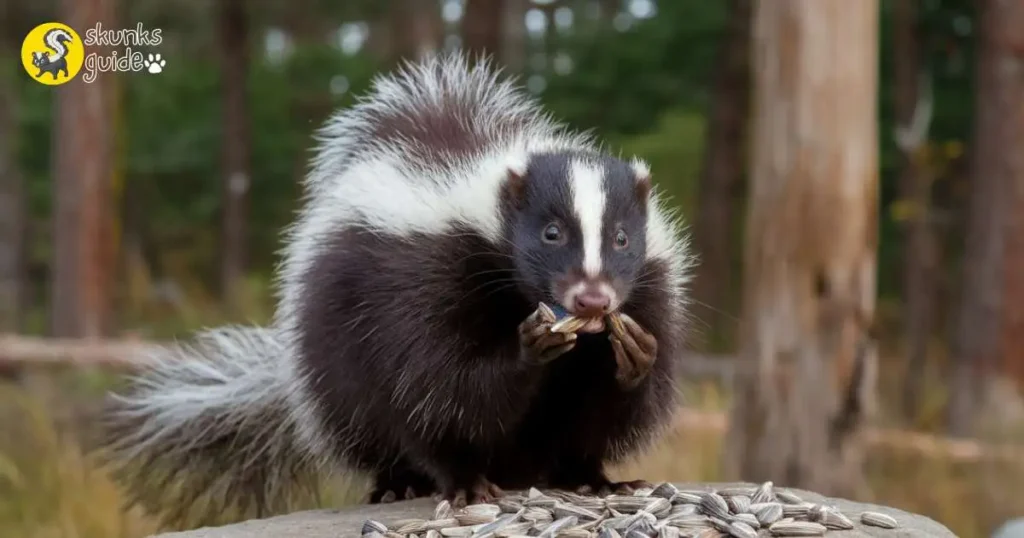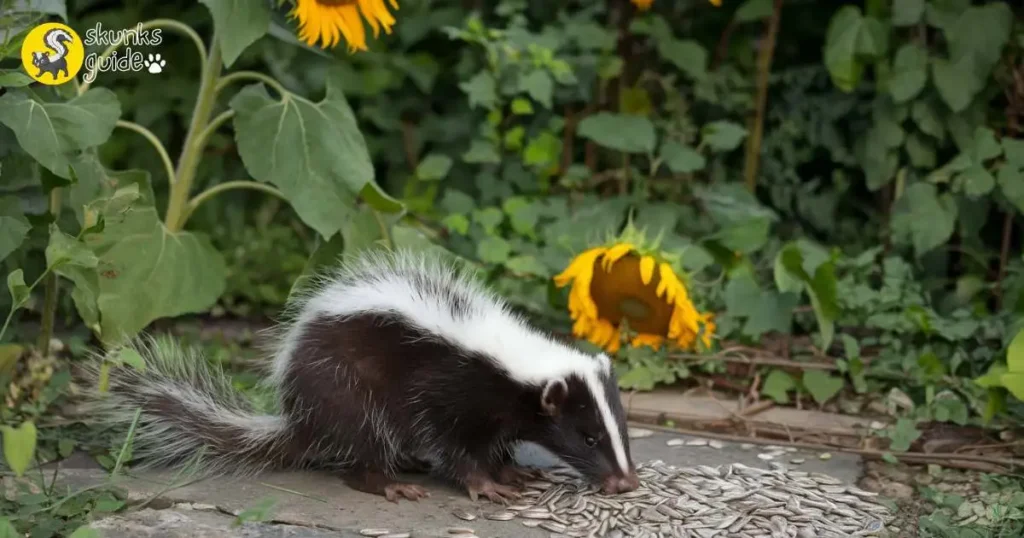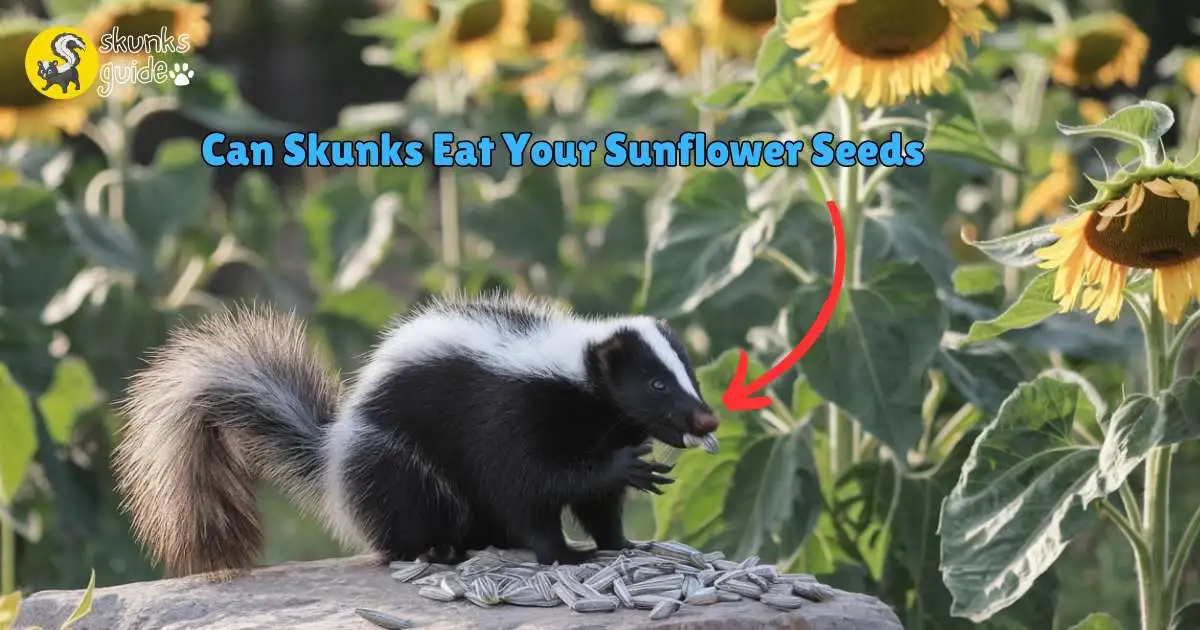Can Skunks Eat Your Sunflower Seeds? How to Protect
Last updated on August 23rd, 2024 at 11:49 pm
Yes, skunks do eat sunflower seeds, and they’re pretty fond of them too! As someone who has studied skunks closely, both in the wild and as a pet owner, I’ve noticed they have a real appetite for seeds, especially sunflower seeds. These creatures are night-time foragers, often found raiding bird feeders and gardens for their next snack. If you’re trying to keep your garden safe from these curious critters, understanding their eating habits can make a big difference. Let’s dive into what makes sunflower seeds so appealing to skunks and how you can manage their visits to your yard.
Skunks In Your Backyard
Seeing a skunk in your backyard can be surprising. These animals are often shy and prefer to avoid humans. They can be curious and may wander into gardens. This leads to many wondering about their eating habits, especially regarding sunflower seeds.
Attracted To Gardens
Skunks enjoy exploring gardens for tasty treats. They are omnivorous and eat a variety of foods. Here are some common garden foods skunks may eat:
- Fruits like berries and melons
- Vegetables such as corn and carrots
- Insects and grubs
- Seeds, including sunflower seeds
Sunflower seeds can attract skunks. They find these seeds easy to access. A garden with sunflower plants may see skunks visiting more often. Protecting your garden may require some effort.
Nocturnal Foragers
Skunks are primarily active at night. They search for food under the cover of darkness. Their nocturnal habits make them less noticeable. Skunks have a keen sense of smell, which helps them find food.
Here’s a quick look at their foraging habits:
| Activity | Time |
|---|---|
| Foraging for food | Nighttime |
| Eating sunflower seeds | Occasionally at night |
| Seeking shelter | Daytime |
Skunks may dig in gardens for seeds. They can cause some damage while searching. Keeping gardens clean can help reduce skunk visits.
Sunflower Seeds And Skunks
Skunks are curious creatures. They explore various foods in their environment. One popular snack is sunflower seeds. These seeds are not just tasty; they also hold nutritional benefits.

A Snack For Omnivores
Skunks are omnivores. They enjoy a wide range of foods. This includes fruits, insects, and nuts. Sunflower seeds fit perfectly into their diet.
- Skunks love to dig and forage.
- They find seeds in gardens and parks.
- Seeds are easy to eat and digest.
Nutritional Appeal
Sunflower seeds offer many nutrients. They are rich in healthy fats, proteins, and vitamins. Here’s a quick look at their benefits:
| Nutrient | Benefit |
|---|---|
| Protein | Supports muscle growth and repair. |
| Healthy Fats | Provides energy and promotes heart health. |
| Vitamin E | Acts as an antioxidant for healthy skin. |
In summary, sunflower seeds are a great treat for skunks. Their nutritional value makes them a perfect snack. Skunks enjoy the taste and the energy boost.
Protecting Sunflower Seeds
Sunflower seeds attract many animals, including skunks. Protecting your seeds is essential. Skunks are known for digging and eating seeds. Here are effective ways to keep them safe.
Deterrent Strategies
Using various deterrent strategies can help protect your sunflower seeds. Below are some effective methods:
- Natural Repellents: Use strong scents like vinegar or citrus.
- Noise Makers: Wind chimes or motion-activated devices can scare skunks.
- Spicy Sprays: Mix water with hot pepper. Spray this mixture around your garden.
Fencing And Covers
Fencing and covers provide strong protection against skunks. Here are some tips:
| Type | Description |
|---|---|
| Wire Fencing | Install a fence at least 3 feet high. Bury the bottom 6 inches deep. |
| Garden Covers | Use lightweight mesh or netting to cover plants. |
| Raised Beds | Build raised garden beds. This makes it harder for skunks to dig. |
These methods will help keep your sunflower seeds safe from skunks. Implement them to enjoy a thriving garden.
Sunflowers In The Ecosystem
Sunflowers play an important role in nature. They attract various wildlife and support the ecosystem. Their seeds provide food for many animals, including skunks. Understanding their role helps us appreciate their value.
Attracting Wildlife
Sunflowers are a magnet for wildlife. Many animals visit sunflowers for their seeds. Here are some common visitors:
- Birds
- Squirrels
- Rabbits
- Skunks
These animals help spread sunflower seeds. This process leads to more sunflowers growing. A healthy sunflower patch supports local wildlife.
Role In Biodiversity
Sunflowers contribute significantly to biodiversity. They provide food and shelter for many creatures. Here’s how they help:
| Benefit | Description |
|---|---|
| Food Source | Seeds nourish birds, mammals, and insects. |
| Habitat | Sunflower plants offer shelter for small animals. |
| Pollinator Support | Flowers attract bees and butterflies. |
By supporting various species, sunflowers enhance ecosystem health. Healthy ecosystems maintain balance and resilience.
Skunk Behavior And Food Sources
Skunks are fascinating creatures known for their unique behaviors. Their diet varies widely based on availability. Understanding what skunks eat helps us appreciate their role in the ecosystem.

Seasonal Diet Changes
Skunks change their diets with the seasons. Their food sources fluctuate based on what is available. Here’s a breakdown of their seasonal preferences:
| Season | Common Food Sources |
|---|---|
| Spring | InsectsGrassesFruits |
| Summer | VegetablesFruitsSmall mammals |
| Fall | NutsSeedsInsects |
| Winter | RootsStored foodSmall rodents |
During spring, skunks eat insects and young plants. In summer, they enjoy fruits and small mammals. As fall approaches, they seek nuts and seeds. Winter brings a shift to roots and stored food.
Adaptability In Urban Areas
Skunks thrive in urban settings. They adapt easily to city life. Here are some ways they find food:
- Foraging in gardens
- Scavenging in trash cans
- Visiting bird feeders
Skunks often eat sunflower seeds from bird feeders. They are clever and resourceful. Their ability to adapt makes them successful in urban environments.
Understanding skunk behavior helps us coexist peacefully. Recognizing their food sources can minimize conflicts. Skunks play an essential role in controlling pest populations.
Frequently Asked Questions
What Is Skunk’s Favorite Food?
Skunks enjoy a varied diet. Their favorite foods include insects, fruits, and small rodents. They also eat plants, eggs, and carrion. Skunks are opportunistic feeders, adapting their diet based on availability. This flexibility helps them thrive in different environments.
What Attracts A Skunk To Your Yard?
Skunks are attracted to yards by food sources like pet food, garbage, and fallen fruit. They also seek shelter in dense vegetation or under decks. Water sources, like birdbaths, can draw them in as well. Maintaining a clean yard can help deter these nocturnal visitors.
Are Skunks Attracted To Bird Seed?
Yes, skunks are attracted to bird seed. They enjoy the seeds and may raid feeders. To prevent this, use squirrel-proof feeders and clean up spilled seeds promptly. Securing trash cans also helps deter skunks from your yard. Keeping the area tidy is essential for reducing their attraction.
Conclusion
Skunks are opportunistic feeders and may nibble on sunflower seeds. While they enjoy a variety of foods, seeds are not their primary diet. Understanding skunk behavior helps in managing backyard wildlife. To keep your garden safe, consider protective measures. A balanced approach benefits both your plants and local skunk populations.

